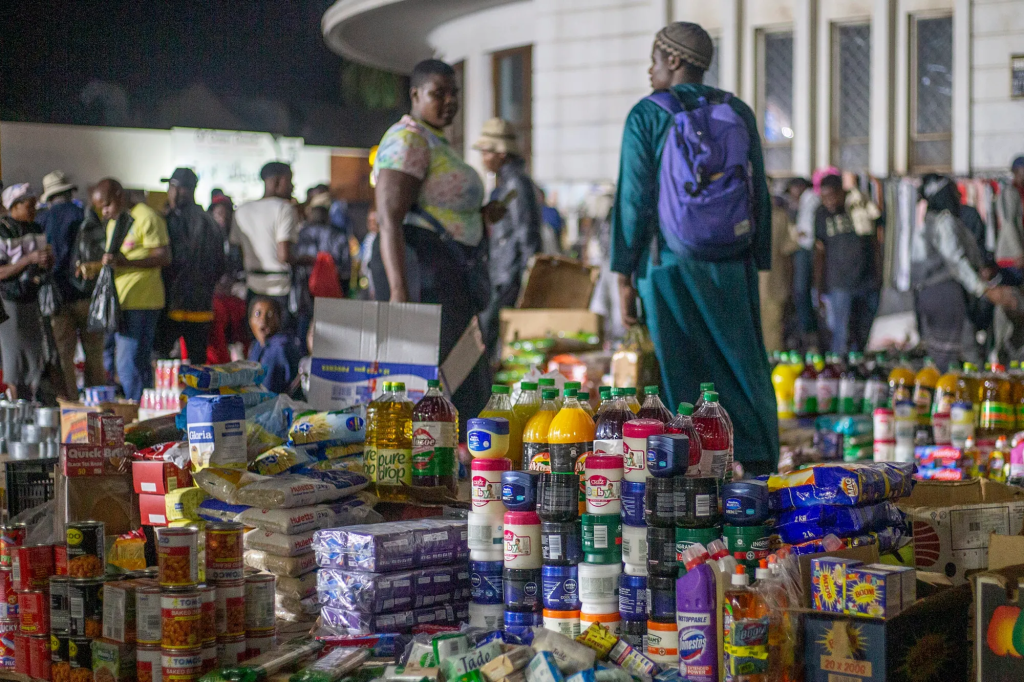
Shifting Consumer Behavior
Batsirai Pabwe, a 30-year-old shopper, recently visited one of these night bazaars for the first time. “It’s much cheaper than the supermarkets,” he said, filling his bag with groceries for just $20—an amount that barely covered a few items in a formal store just a week earlier. As he navigated through an array of products spread across parking spaces and sidewalks, Pabwe illustrated the shift in consumer behavior driven by the currency’s volatility.
The Rise of Zimbabwe’s Informal Markets
The ZiG replaced a previous currency that had suffered severe depreciation and was often rejected by the public. This marked Zimbabwe’s sixth attempt at establishing a stable currency since the catastrophic collapse of the Zimbabwe dollar in 2009. The government celebrated the launch with catchy jingles and optimistic projections. However, just seven months later, it seems history is repeating itself.
The gap between official and black market exchange rates has widened significantly. Many consumers and traders now prefer the more stable U.S. dollar over the local currency. Traditional retailers find themselves in a bind; they must accept the ZiG at artificially low official rates while facing rising operational costs. This situation forces many stores to increase their prices to remain viable, but such measures render them uncompetitive against informal traders who operate without these burdens.
Challenges for Traditional Retailers
Oswald Gari, a street vendor who works exclusively at night to avoid police scrutiny, noted that “business is booming.” He sells groceries and other essentials at prices often half of what consumers pay in formal stores. The contrast between bustling street markets and nearly empty supermarkets is stark; while vendors call out deals to eager shoppers, traditional retailers struggle to attract customers.
The Retailers Association of Zimbabwe warns that many licensed stores face imminent closure due to these unfavorable conditions. In October 2024, major grocery chain Pick n Pay announced it had effectively written off its investment in Zimbabwe due to deteriorating economic conditions. Gift Mugano, an economics professor, emphasized that every transaction within formal retail incurs an exchange rate loss that current pricing strategies cannot offset.
The Night Bazaar Experience
As night falls over Harare, sidewalks transform into vibrant marketplaces where everything from fresh meat to clothing is available. Informal vendors do not bear the same overhead costs as their formal counterparts; they often operate without electricity or expensive leases. This flexibility allows them to offer lower prices and attract customers looking for affordable options amid rising costs.
Pabwe’s experience is not unique; many consumers now prefer shopping at these night markets where they feel less confused about pricing and value compared to traditional stores. “It’s quite confusing for people like me who really don’t understand the value of the ZiG,” he admitted. The informal markets have become essential for many Zimbabweans navigating an increasingly challenging economic landscape.
The Informal Economy’s Growth
The rise of these night bazaars highlights a significant shift in Zimbabwe’s retail environment. More than 80% of the employable population now relies on informal work for survival. Economic realities have forced individuals like Gari into this sector out of necessity rather than choice. With formal employment opportunities dwindling and industrial sites being repurposed for imported goods, informal trading has become a lifeline for many families.
Zimbabwe’s Uncertain Future Ahead
As Zimbabwe grapples with its currency crisis, uncertainty looms over both traditional retailers and consumers alike. The government’s attempts to stabilize Zimbabwe’s economy through new monetary policies have yet again faltered, leading many to question whether any lasting solutions exist. For now, as long as night markets continue to flourish under the cover of darkness, they will remain crucial for countless Zimbabweans seeking affordability in an unpredictable economic climate.

